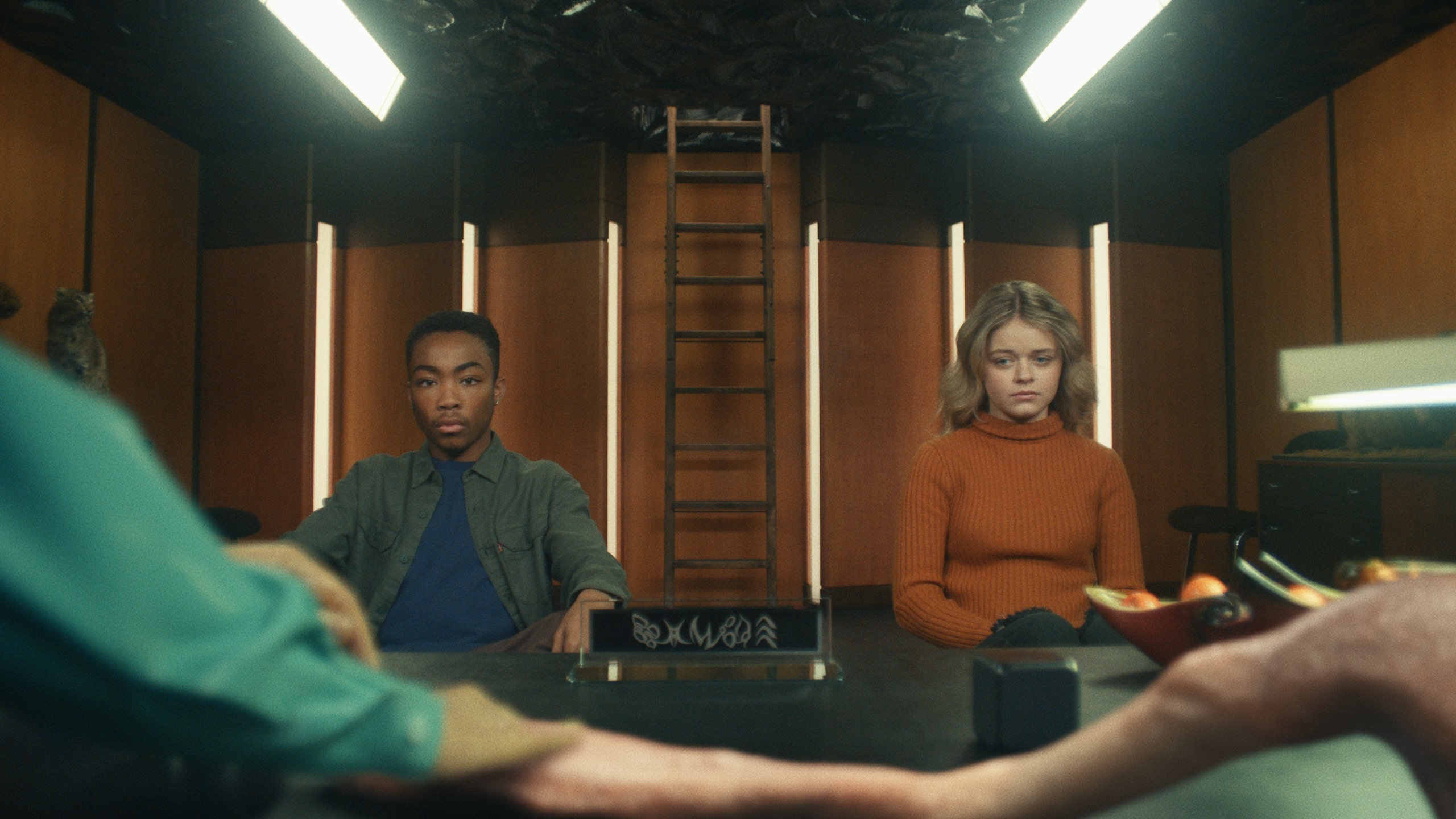Sundance unleashed a baffling mess last week with the satire “Landscape with Invisible Hand,” the latest movie from “Thoroughbreds” director Cory Finley. For his third project, he invests a lot of time and care into a story about existence after an alien invasion, which features a lot of funhouse reflections on human life. But the movie is so disjointed that Finley’s take on absurdity only leaves one cold instead of amused.
It’s the 2030s, and a race of aliens called the Vuvv—pink bread loaves with slippers for hands that they talk with using scrapes—have taken over the world. But they haven’t taken away much of what makes life in America. They’ve just rebranded it. The education system is still struggling, as students like Adam (Asante Blackk) and Chloe (Kylie Rogers) have to learn about Vuvv culture and language, things that will only help them become drones, not free-thinkers. And human lives are treated as entertainment, so Adam and Natalie start to broadcast their high school love for the Vuvv audience, who are asexual but appreciate human love. It’s a funny idea that stays shallow—“Landscape with Invisible Hand” wants to be admired for such cynical send-ups, but its commentary is nowhere near sharp enough.
With momentum only coming from the movie’s commitment to its strangeness, “Landscape with Invisible Hand” toys with home-life elements, including how one of the Vuvv would try to integrate into a human role as a parent to humans. Tiffany Haddish (as Adam’s mom) and Josh Hamilton (as Chloe’s dad)—in ways that shouldn’t be spoiled—have some fun with the bizarre premise. And Michael Gandolfini has a small part as someone who wants to work for the Vuvv; his arc becomes one of many stories undeveloped by Finley’s script. These performances save Finley from disaster as everyone gets in on the riffs.
Among its pile of ideas that create far more tediousness than momentum, there’s also a flying city run by the Vuvv and hovers over regular on-the-ground human life. Meanwhile, composer Michael Abels (who previously scored “Nope,” a comparison point that appears and then vanishes) offers a classic theremin-heavy score to nudge how we should read this like a parody of an invasion story. And the aliens are never seen as threatening, adding to how light this is. But “Landscape with Invisible Hand” is hard to take seriously, even for how little this strange lark wants that at all.

Anthony Chen’s “Drift,” the Singaporean filmmaker’s first English-language picture and Sundance debut, is a well-intentioned movie about slowing down, taking a breath, and letting others in. But it’s so hard up for an example of kindness and connection that it goes to extremes to make its point while hardly filling in characters in its place. One could call the movie self-indulgent, but it does not feel manipulative so much as misguided.
Cynthia Erivo wanders through much of the movie, which takes place around the opulent cliffsides of Greece. Her character, Jacqueline, is penniless and skittish about talking to people; she has a special place on a beach where she buries her belongings. When she steals some olive oil from a restaurant, she’s able to give foot massages to tourists on the beach. And when she eats the food of her labor, a voice can be heard telling her to slow down. Waves crash throughout the film’s sound mix like a white noise machine, while Jacqueline has flashbacks to images from a previous life—she has much longer hair, she’s in love with a woman in London, and then is welcomed back home to Libera, where her wealthy family is celebrating her sister’s pregnancy. But something has happened to put her in her current state, and “Drift” holds onto the reveal like a cheap twist.
One day while floating through the hillside, she meets Callie (Alia Shawkat), an American tour guide. Callie is friendly to Jacqueline immediately; Jacqueline tells her that her husband is back at a hotel, one of many lies she’s told for who knows how long. She’s also the kind of person who doesn’t question when to help others—Shawkat helps Callie feel real, though it’s clear how much of a symbol she is meant to be for this script that becomes hollow and overwrought simultaneously.
“Drift” slowly builds this chemistry to one big emotional climax. Eventually, we see the horrific events that profoundly affected Jacqueline, and we also get to see Erivo unleash a torrid of emotional catharsis. But while “Drift” prides itself on being so spacious, there is no subtle path to this scene or from it. And while Erivo gives it her all, Chen’s cutting between past and chest-heaving present bungles the effect of an otherwise on-the-nose scene and mission statement.












